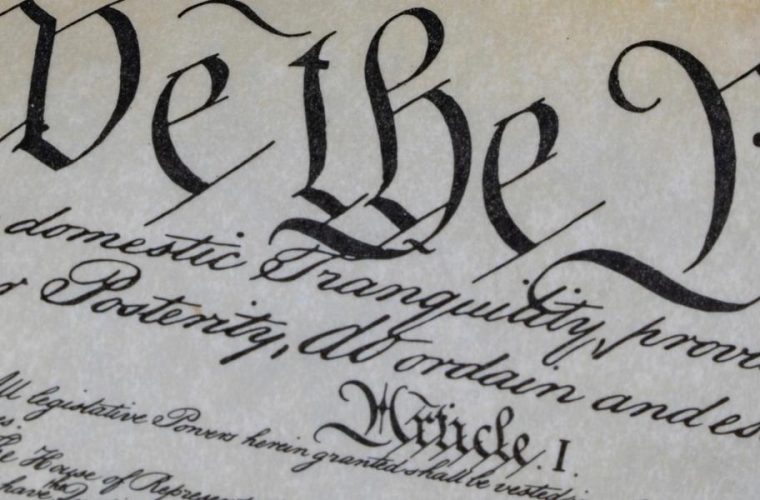
Property Rights, Civilization, and Their Enemies
[This article is adapted from a lecture delivered at the Reno Mises Circle in Reno, Nevada. on May 20, 2023.]
It is not an exaggeration to say that property rights are a prerequisite for civilization. As Ludwig von Mises wrote in The Free and Prosperous Commonwealth:
Private property creates for the individual a sphere in which he is free of the state. It sets limits to the operation of the authoritarian will. It allows other forces to arise side by side with and in opposition to political power. It thus becomes the basis of all those activities that are free from violent interference on the part of the state. It is the soil in which the seeds of freedom are nurtured and in which the autonomy of the individual and ultimately all intellectual and material progress is rooted (emphasis added).
The story of the Pilgrims shows that America was literally created because of the recognition of this truth. In 1607 all but 38 of the original Jamestown, Virginia settlers were dead from famine. An additional 500 came and 440 died. This was known as the “starving time.” Sir Thomas Dale, the high marshal of the Virginia colony, recognize the problem to be what we would today call agricultural socialism. The residents of the colony worked the fields and shops and everything was put into a common store. Each family was given an equal allotment. Thus, the man who worked diligently fourteen hours a day was paid the same as the man who decided to work not at all.
Sir Thomas Dale gave each man three acres of private land to homestead, which was soon expanded to 50 acres. It made all the difference, as people realized that the harder, smarter, and longer they worked, they more they and their families would prosper.
The exact same scenario played out years later in Plymouth, Massachusetts where half of the original pilgrims died. The wife of William Bradford, the leader of the Mayflower expedition, committed suicide by jumping off the Mayflower because of all the death surrounding her. Her husband, like Sir Thomas Dale, finally figured out the problem—the absence of private property and secure property rights. Homesteading of private property was established, and the American colonists began to thrive.
Homesteading combined with secure property rights and almost no government intervention resulted in each region of the colonies excelling by relying on their comparative advantages. New England excelled in shipping, fishing, and primitive manufacturing, while the Southern colonies became agricultural powerhouses. The American economy in 1775 was 100 times larger than it was in the 1630s and the American colonists had one of the highest per capita incomes in the world.
The American Revolution was a war of secession from the corrupt mercantilism of the British empire characterized by cronyism, protectionism, military imperialism, and central banking in the form of the Bank of England. Citizens of empires are viewed by their rulers as mere tax slaves and cannon fodder at the disposal of the state, and the American colonists had had enough of it.
The Road to Legal Plunder
In his recently published John C. Calhoun: Statesman for the Twenty-First Century, Clyde Wilson pointed out that in his famous 1850 Disquisition on Government, which Murray Rothbard praised as the greatest work in political philosophy written by an American, Calhoun perceived the political world of the first fifty years of the nineteenth century as a constant battle between the Hamiltonian vision of a highly centralized, monopolistic state with heavy taxes, heavy public debt, protectionism, corporate welfare, and military aggression financed by a central bank, and the Jeffersonian vision that was essentially the opposite. (Hamilton argued for a permanent president at the constitutional convention and stormed out when he didn’t get his way).
Presidents Jefferson, Madison, Monroe, Jackson, and Tyler all opposed or vetoed some or all of the Hamiltonian vision, dubbed “The American System” by Hamilton himself, which included protectionism, corporate welfare, and central banking. Such a vision provides the ingredients of what Frederic Bastiat called “legal plunder” in his famous book, The Law, also published in 1850. Calhoun’s Disquisition and Bastiat’s The Law both eloquently made the natural law argument that in theory government can be used to protect life, liberty and property. However, these two great men wrote, government can also pervert its legitimate purpose and abolish property rights with such interventions as protectionism. “The Law Perverted” appears in bold print in The Law where Bastiat discusses this point.
Hamilton and his political heirs such as Henry Clay and Lincoln always wanted to bring the corrupt British mercantilist system that the colonists fought a revolution against to America, cynically calling this putrid British political regime the “American” system. They finally succeeded in the 1860s when Lincoln, dubbed “the political son of Alexander Hamilton” by Lincoln biographer Edgar Lee Masters, ushered in fifty years of protectionist tariffs (increasing the average tariff rate from 15% to around 60%; showered his former employers, the railroad corporations, with historic levels of corporate welfare (which led to the biggest political corruption scandal in American history up to that point during the Grant administration); and nationalized the money supply with the National Currency Acts and Legal Tender Acts. The road to legal plunder had become a highway. Once the railroad corporations were subsidized, myriad other industries began marching to Washington to beg for their share of the loot.
One consequence of Lincoln’s war was that the federal government finally became a judicial dictatorship, with five government lawyers with lifetime tenure empowered to declare what liberties all Americans were to be afforded. Before the war there was a widespread belief that especially on issues as important as constitutional liberty, there should be opinions offered by all three branches of government, not just the judiciary, as well as the people of the sovereign states. When the “supreme” court declared the Bank of the United States to be constitutional, President Andrew Jackson responded by essentially saying thank you for your opinion, but my opinion is the opposite, and my opinion is just as valid as your opinion.
Before the war many states, North and South, nullified federal legislation that they believed was unconstitutional. That cause the federal government to be somewhat more devoted to the Constitution. That all became history because of the war and the massive centralization of governmental power that it created. The Jeffersonians had long warned that if the day ever came when the federal government itself became the sole arbiter of the limits of its own powers, then Americans would live under a tyranny. Is there a better example of “the fox guarding the henhouse?”
An especially damaging “supreme” court decision that really opened the floodgates of legal plunder was the 1877 case of Munn v. Illinois. Farmers had near monopoly political power in the Midwest and used it to gang up on and plunder two brothers who operated a grain storage business. They got the Illinois legislature to pass a price ceiling law on grain storage, an act of legalized theft if ever there was one. They gave no sappy widows-and-orphans excuse for the law; they had to power to get the legislature to steal from the Munn brothers, and so they did.
The majority of the “supreme” court declared that if one does business that affects “the public” then one must submit to regulation of your business by “the public.” Of course, by “the public” they really meant the sleazy political criminals in the Illinois legislature at the time (some things never change).
The dissent in the case was written by the heroic Justice Stephen Field who said, “The principle upon which the opinion of the majority proceeds is, in my judgment, subversive of the rights of private property, heretofore believed to be protected by constitutional guarantees against legislative interference.” It was “heretofore” believed that property rights are protected by the constitution, said Justice Field. He also warned that once such legal plunder was declared to be fair game, then the Munn brothers would have the “right” to organize their own political coalition to plunder the farmers of Illinois with their legislation. And on and on it would go with plunder seeking run amok. This was the very thing that James Madison warned against in Federalist #10 when he argued that the whole purpose of the Constitution was to limit “the violence of faction,” by which he meant this sort of special-interest politics.
Regulatory plunder soon became pervasive and common place, with the Interstate Commerce Commission created to enforce a monopoly cartel for the railroad corporations; “natural” monopolies created by government regulation for the utility industries (see my article, “The Myth of Natural Monopoly”); The Civil Aeronautics Board created to enforce a cartel for the airline industry; The Fed created as a banking industry cartel; and much more. Corporations have been true capitalism’s worst enemies.
This all evolved into fascism during the FDR administration. In his famous book, The Roosevelt Myth, John T. Flynn wrote of how the National Recovery Administration was almost identical in every way to how Mussolini centrally planned the Italian economy. “This was fascism,” he wrote.
The biggest attack on property rights was the adoption of the federal income tax in 1913. As Frank Chodorov explained in The Income Tax: Root of All Evil, the government was now saying the following:
Your earnings are not exclusively your own. We have a claim on them, and our claim precedes yours. We will allow you to keep some of it, because we recognize your need, but not your right; but whatever we grant you for yourself is for us to decide. . . . The amount of your earnings that you may retain for yourself is determined by the needs of the government, and you have nothing to say about it.
The income tax thus established the federal government as essentially the largest criminal gang on the planet, a Mafia times ten thousand, or a hundred thousand, in terms of bald-faced theft and the enslavement of a large part of the population for at least part of the year. (“Tax Freedom Day,” when the average American earns enough just to pay all of the taxes due, currently occurs in April).
The New Road to Totalitarian Destruction
Political cronyism and legal plunder continue to metastasize and are especially visible in the unholy alliances between the pharmaceutical corporations, the banking industry, “tech” companies, and the state. But the attacks on property rights and civilization took a more directly destructive turn beginning in the 1960s when the Marxist Left settled on green totalitarianism as their new strategy, designed to literally destroy the free enterprise system once and for all and impose socialist central planning in the name of Mother Earth. As Mises wrote in Human Action (p. 414), socialism has always been “the spoiler of what thousands of years of civilization have created.” It has always been about “destructionism,” wrote Mises, in the form of destroying all of existing societies to supposedly start from scratch in designing and centrally planning humanity.
First came such books as The Population Bomb, a neo-Malthusian farce that warned that population was outstripping resources, which would lead to worldwide starvation. Author Paul Ehrlich became a celebrity by arguing for sterilants placed in public water supplies and a neutering of the Catholic church so that it could no longer oppose abortion. The Marxist Left had abandoned its pretense of being for “the people.” It now hated “the people” and wanted as few of them to survive as possible. The founder of Earth First! even famously declared that “we can only hope the right virus comes along.”
The second strategy was to claim that pollution caused by capitalism was blocking the sun and causing a new ice age. “U.S. Scientist Sees New Ice Age Coming,” blared a July 9,, 1970 Washington Post headline. “Scientist Predicts New Ice Age by 21st Century,” blared the Boston Globe on April 16, 1970. There were hundreds of other similar scary headlines all throughout the 1970s. The only way to save ourselves, we were told, was to destroy economic freedom and property rights and replace them with socialism and central planning.
That of course didn’t’ happen in the 1970s, so the Marxist Left resorted to a Plan B. “Rising Seas Could Obliterate Entire Nations” said an Associated Press headline on June 30, 1989. “Snowfalls are Now Just a Thing of the Past,” advised the British Independent on March 20, 2000. Now global warming was going to destroy the world. Unless of course we destroy economic freedom and property rights and replace them with socialism and central planning.
Well, that didn’t work out either for the Marxist Left. We did not destroy our economy, despite the best efforts of the political class and the Fed. So now the new mating call of the Marxist Left is climate change. The world’s climate has been changing for millions of years, but that must be put to an end, we are told. And the only way to do that would be to destroy free enterprise and property rights and replace them with socialism and central planning. A necessary first step, the president of the United States recently stated publicly, would be to end the use of fossil fuels altogether. No thought seems to have been given to the negative consequences of that.
The Real Isolationists
In Human Action, Mises wrote that “What distinguishes man from animals is the insight into the advantages that can be derived from cooperation under the division of labor.” It is important to realize that when we talk about trade and exchange, it is property rights that are being traded and exchanged. The advantages of the division of labor require a high degree of economic freedom, and especially private property. Mises went on to say:
Man curbs his innate instinct of aggression in order to cooperate with other human beings. The more he wants to improve his material well being, the more he must expand the system of the division of labor. Concomitantly he must more and more restrict the sphere in which he resorts to military action. The emergence of the international division of labor requires the total abolition of war. Such is the essence of the laissez faire philosophy. . . . This philosophy is, of course, incompatible with statolatry.
A large part of the international division of labor was abolished during the twentieth century by war, socialism, and the Cold War. Nothing destroys the benefits of the division of labor more than war. Americans are always isolated from those whom they are waging war with, giving the lie to the standard neocon line that the advocates of peace are “isolationists.” Nothing—nothing—isolates us from other parts of the world than war. How many American businesses do you suppose are currently planning to start up entrepreneurial ventures in Ukraine? How about Syria, Iraq, or Afghanistan? Sure, you have the politically connected vultures who swoop in to make billions rebuilding countries that we or our “allies” have bombed into the stone age. Rebuilding infrastructure that our own bombs destroyed is the modern-day version of the old joke about how so many government jobs are similar to people getting paid to dig a hole and then fill it up again. Only this time the hole is created by mega-ton bombs, filled up with multibillion-dollar government contracts to corporations that have made significant “campaign donations” to the politicians who ordered the bombings in the first place. The neocons who have instigated all of these endless wars are the real isolationists and destroyers of the international division of labor and the civilizations that it creates.



